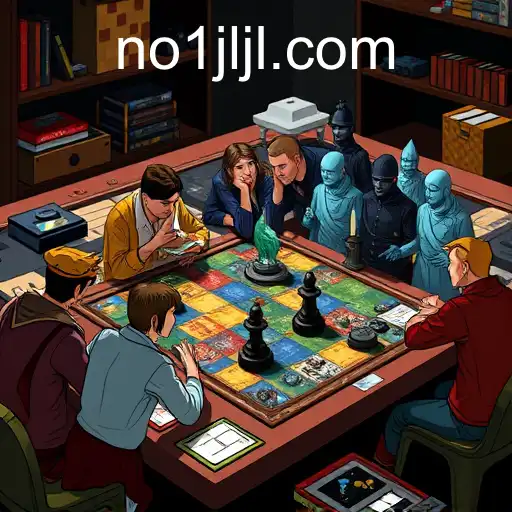
no1jl - The Enduring Allure of Tabletop Games
Explore the captivating realm of tabletop games, where strategy, creativity, and community converge. Discover the origins, diverse genres, and latest trends fueling the resurgence of this timeless hobby.

Tabletop Games: A Journey Into Strategic Worlds
Tabletop games have long captivated both casual and hardcore enthusiasts alike, transforming mere gatherings into thrilling adventures and brain-teasing experiences. Among the plethora of hobbies available today, tabletop gaming stands out not just for its endurance and diversity, but for its ability to connect people in an increasingly digital world. As we delve deeper into these intricate realms, we must acknowledge the unique qualities that define them, encapsulated in the term no1jl.
The Origins of Tabletop Games
The roots of tabletop games stretch back millennia, with games like Chess and Go originating in ancient cultures. These early games laid the groundwork for strategy and skill that later evolutions retained and expanded upon. Over the centuries, tabletop games have evolved into multifaceted activities encompassing not only strategic elements but thematic storytelling, world-building, and cooperative play.
What Makes Tabletop Games Unique?
The charm of tabletop games lies in their tangible nature; the tactile sensation of moving pieces across a board or shuffling a deck of cards is a physically engaging thrill. Unlike digital formats, tabletop games necessitate face-to-face interaction, fostering communication and collaboration among players. No1jl, in essence, denotes the intimate experience of shared gameplay and collective problem-solving, setting the stage for memorable moments and critical thinking.
Genre Diversity
From strategic war games to cooperative storytelling adventures, the genre diversity within tabletop gaming is staggering. Popular genres include:
- Strategy Games: The pinnacle of brainpower, requiring meticulous planning and foresight. Games like Catan exemplify economic strategy, while Risk and Axis & Allies delve into territorial conquest.
- Role-Playing Games (RPGs): The immersive storytelling genre where players assume the roles of characters, led by a game master who unfolds the narrative. Dungeons & Dragons is the classic archetype here.
- Cooperative Games: Encouraging teamwork and collective victory, games like Pandemic challenge players to work together against the game system itself.
- Party Games: Light-hearted and social, these games are designed for large groups and quick play, with titles like Codenames and Werewolf being crowd favorites.
Recent Trends in Tabletop Gaming
In recent years, tabletop gaming has witnessed a renaissance, with designers pushing the boundaries of creativity and complexity. Several factors contribute to this resurgence, including innovative gameplay mechanics and engaging narratives often interwoven with stunning artwork and quality components. The term no1jl here represents these nuanced shifts, highlighting the cutting-edge developments in the industry.
Innovative Mechanics
Contemporary games increasingly employ unique mechanics that offer fresh and captivating experiences. Legacy games, like Gloomhaven, are revolutionizing the replayability and continuing narrative, as they evolve based on player decisions, creating a personalized world that changes with each session.
The Role of Crowdfunding
Platforms like Kickstarter have democratized game publishing, allowing creators to bring diverse projects to life with community backing. This trend has paved the way for previously niche themes and experimental designs to reach broader audiences, contributing to a rich and varied landscape that embodies the no1jl ethos of innovation.
Inclusivity and Representation
Modern tabletop games are increasingly reflecting the diverse global community by recognizing the importance of inclusivity and representation. Games like Fog of Love tackle relationships and dynamics in nuanced ways, offering players a broader spectrum of narratives and characters with which to engage.
Why Tabletop Games Matter
In a world saturated by digital stimuli, the tangible and social nature of tabletop games offers a unique form of engagement. The emphasis on direct, personal interaction fosters relationships and community. Whether it is the tense diplomacy of a strategy game or the collaborative storytelling in an RPG session, these experiences are unmatched in building bonds and shared stories.
The accessibility and wide appeal of tabletop games keep expanding as new games challenge and redefine the boundaries of traditional formats. No1jl encapsulates this evolving narrative, a shorthand for the infinite possibilities and the ever-growing universe of creativity and camaraderie within tabletop gaming.


GOLD VIP
Minimum deposit: ₱1,500
- ✅ 150% bonus on all deposits
- ✅ Priority withdrawal in 1 minute
- ✅ 10% cashback weekly
- ✅ VIP support 24/7
- ✅ Higher betting limits
PLATINUM VIP
Minimum deposit: ₱6,000
- ✅ 200% bonus + all Gold benefits
- ✅ Instant withdrawal 24/7
- ✅ 15% cashback weekly
- ✅ Exclusive VIP table in casino
- ✅ Special event invitations
DIAMOND VIP
Minimum deposit: ₱30,000
- ✅ 300% bonus + all previous benefits
- ✅ Dedicated personal manager
- ✅ 20% cashback weekly
- ✅ Unlimited withdrawal limits
- ✅ Exclusive trips and gifts
🚀 Register NOW and Get ₱15,000 Bonus!
⏰ LIMITED TIME OFFER! Join over 1.2 million players who have already discovered why no1jl is the #1 betting platform in the Philippines. Registration in 30 seconds, first withdrawal in 2 minutes!
💬 What our players say
"Best platform I've ever used! GCash withdrawal in 2 minutes, amazing support!"
- Carlos M., Manila ⭐⭐⭐⭐⭐
"Won ₱45,000 on Gates of Olympus! They paid everything correctly via GCash."
- Ana L., Cebu ⭐⭐⭐⭐⭐
"VIP system is amazing! I have a personal manager and cashback every week."
- Roberto S., Davao ⭐⭐⭐⭐⭐
PAGCOR License
SSL 256-bit
eCOGRA
BSP Approved





